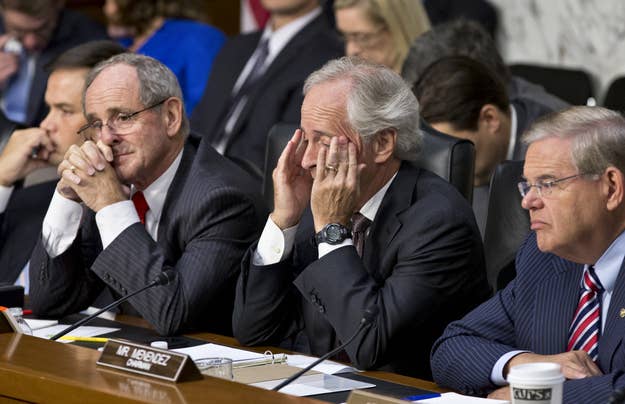
WASHINGTON — The Senate Foreign Relations Committee passed a revised resolution authorizing a strike in Syria on Wednesday.
In a vote of 10-7, with Democratic Sen. Ed Markey voting "present," the new language drafted by Chairman Bob Menendez and Ranking Member Bob Corker narrowed the scope of the administration's proposed resolution. It explicitly prohibited ground troops in the country and defined the length of time the president could approve air strikes in the country.
Two Democrats — Sens. Chris Murphy and Tom Udall — joined Republicans Jim Risch, Marco Rubio, Ron Johnson, John Barasso, and Rand Paul in voting against the resolution. Corker, along with Sens. John McCain and Jeff Flake, approved the resolution.
The new resolution will now go to the full Senate for a vote, and congressional leaders hoped the new tightened language would help bring on support for the measure. But the close committee roll call shows just how divided Congress is over the potential military strikes, and passage is far from guaranteed. An even more skeptical House is also expected to take up the measure next week when they return from the August recess.
The approval of the new resolution came a day after Secretary of State John Kerry and Defense Secretary Chuck Hagel appeared before the full committee, giving an often muddled message as to why the United States was obligated to strike.
McCain had indicated earlier Wednesday he might vote against the resolution because he found it too narrow in scope. After a long closed-door briefing in the morning, McCain emerged saying he would support a strike if new language was included to clearly state the U.S would like to see a "change the momentum" on the ground in the country in Syria and that Congress supports arming "vetted" rebels. Those amendments passed by voice vote in the committee.
But after the vote, Murphy said that he could not support the resolution — especially in its revised condition — in part because it went further than he was comfortable with.
"I simply believe that the risks of action today outweigh the risks of inaction. Second, given that this resolution also for the first time commits congressional support for arming the Syrian rebels I worry that we have now committed ourselves to a level of support that we'll have to endure past the fall of Bashar al-Assad," he said.
Udall, the other Democrat voting no, said the U.S had not made a strong enough case internationally and believed the resolution would "move the United States toward greater involvement in Syrian civil war."
"As I said yesterday, our attention should be on the source of Assad's ability to continue to ruthlessly kill his own people, and that is support from nations including Russia and China, which are cynically trying to hold the high moral ground," Udall said. "The full force of international rage should come down on those nations that are refusing to allow the U.N. to act and find a solution."
Marco Rubio, a potential 2016 contender, has been openly supportive of intervening in the crisis in Syria for years, but said he ultimately believed that the administration was taking the wrong approach and has been far too slow in responding.
"While I have long argued forcefully for an engagement in empowering the Syrian people, I have never supported the use of U.S. military force in this conflict and I still don't," he said. "I remain unconvinced the use of force proposed here will work. the only thing that will prevent Assad from using chemical weapons in the future is for the Syrian people to remove him from power."

